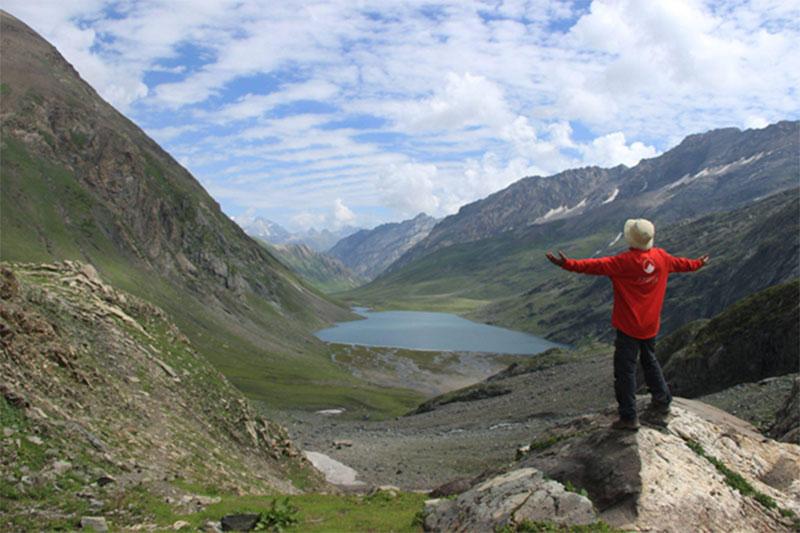
Overview
Kashmir Great Lakes trek is one of the most adventurous treks of Kashmir and trekking trails fills your body with the much-needed rush of adrenaline. However, being adventurous does not mean it is a risky trek. Thousands of people undertake this voyage successfully every year without much difficulty. The gradient of the Kashmir Great Lakes trek is moderate to difficult and you do have to walk on rugged terrains, in the dense forests and sometimes hop boulders. There are steep and narrow ascents and descents and more ups and downs.
The unpredictable weather is a bummer sometimes too with occasional rainfall if you are trekking in July and August.
As far as safety is concerned, there are some things that might be a bit tricky but with the right preparation and carefulness, you can do the trek with ease. It is a long trek so the best recommended thing to do would be contact a tour operator in Kashmir.
They make things simpler for you.
Here, we have broken down some points that can cause some trouble on the trek and how to overcome them to ensure the safest trek.
1. Experience
Experience plays a big role in having a smooth Kashmir Great Lakes trek. If you have never trekked before, you must do a whole lot of preparation. Before the trek, contact a local agency of Kashmir that organises treks, tours etc. The routes of the trek are rough and tougher to navigate especially when they get slippery in rainfall. They provide you with skilled and experienced trek leaders who guide you throughout the trek and you just have to listen to them. You can go for hikes in nearby ranges. Some past experience in trekking is highly appreciated. Beginners and novice hikers, who are not accustomed to high-altitude treks, face way more problems if not prepared well. It is always suggested to do this trek with an experienced trek leader, which is why many tour operators in Kashmir organise such activities for adventure enthusiasts.
2. Weather conditions
Choosing the best time to do Kashmir Great Lakes trek is crucial. The most preferred and convenient time to undertake the trek is in summer, lasting from June to September.
With temperature hovering between 20°C to 30°C , the atmosphere gets balmy and tolerable. You will experience occasional rainfall in late July and August. If you have hastily planned the trek during some other time like winters or spring, it can get worse with closed routes and not easier to navigate routes. Due to unpredictable weather, it is necessary to carry everything that you might need there.
3. Acclimatisation
The one thing that can make your experience on Kashmir Great Lakes trek the worst is if you get sick. The emergency evacuation is very awful and causes troubles for both the travel agency and you. This is where Acclimatization comes to the rescue. Acclimatisation simply means getting used to your surroundings in the mountains before going to high-altitude regions. This is best done by spending some time at your basecamp, for example, in Sonamarg for the Kashmir Great Lakes trek. Avoiding Acclimatization makes you more prone to Acute-Mountain Sickness, where you get ill and have stomach aches, headaches, vomiting and others. Exploring places for a day or two near your basecamp avoids the chances of High-altitude sickness and keeps you sick-free throughout the trek.
4. Clothes to wear:
The thing to know about Kashmir is that you will feel warm during daytime and at nights, it gets chilly like in winters. The unpredictability of weather makes the thinking behind what to wear and pack more important. You should always wear full-sleeve t-shirts and ankle-length bottoms to be safe from insects and when walking in the forests. Layer yourself with some thermals and a windproof jacket to be comfortable during cold wind breezes. Accessories yourself with a beanie, gloves, warm socks and wear sturdy and comfortable boots.
Carry some cotton clothes as well to wear when the sun is out and about. The clothes mentioned should be carried at least a pair or two. Keep some spare of everything. Being comfortable with your clothes makes you feel safe and a smooth journey is ensured.
5. Packing tips:
Kashmir Great Lakes trek takes you to places where not a single shop is seen. Those regions are some of the most secluded parts of India. Such conditions make it absolutely necessary to carry everything you might need there with yourself. Some essentials that must be in your spacious backpack is a first-aid box having basic medicines and personal ones if any, a reusable water-bottle, some power snacks, sunscreen, moisturiser, GPS, a map, satellite phone, portable charger, power bank, torch, insect and mosquitoes repellent etc.
Carry some cash and your credit card along with other important documentation like ID proofs, any permit etc.
Conclusion:
It is more than clear by now that right preparation makes treks safe. People aged to 50-60 years do the treks successfully as they have prepared well. The points mentioned above play a very big role in ensuring your safety on Kashmir Great Lakes trek. You always want to go and come back healthy and fit and have a lot of happy memories. Well, these are some things you need to take care of to have the best and safest time out there.